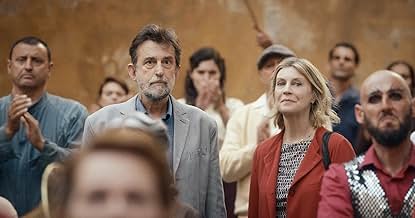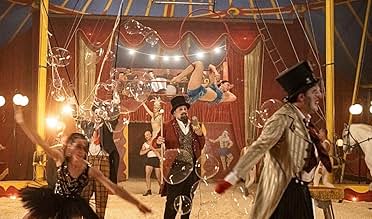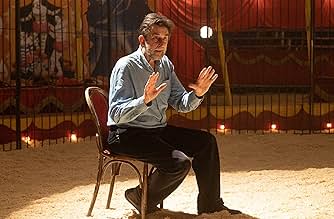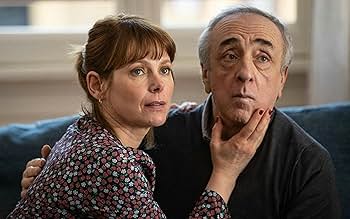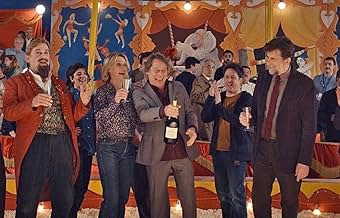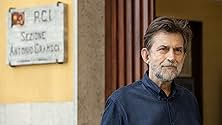IMDb RATING
6.7/10
3.8K
YOUR RATING
A movie director struggles with his relationship with his family, and with his latest movie, about the impact on the Italian Communist Party of the USSR invasion of Hungary in 1956.A movie director struggles with his relationship with his family, and with his latest movie, about the impact on the Italian Communist Party of the USSR invasion of Hungary in 1956.A movie director struggles with his relationship with his family, and with his latest movie, about the impact on the Italian Communist Party of the USSR invasion of Hungary in 1956.
- Awards
- 2 wins & 21 nominations total
Featured reviews
A Brighter Tomorrow, directed by Nanni Moretti, is a deeply introspective work that grapples with the challenges of aging, personal relationships, and the fading ideals of the past. The film weaves a meta-narrative as Moretti portrays a filmmaker struggling to complete a movie about the Italian Communist Party during the USSR invasion of Hungary in 1956, while also navigating the complexities of his personal life.
Moretti's performance is poignant, as he channels his characteristic wit and self-awareness to reflect on the inevitability of change. Margherita Buy and Silvio Orlando deliver nuanced portrayals, adding depth to the story's emotional layers. The interplay between Moretti's fictional and real-life personas creates a dialogue with the audience, blending humor and melancholy in a way that feels uniquely his own.
The film excels in its quieter moments, such as a scene where a reluctant young couple watches *La Dolce Vita*, a symbolic nod to the contrasts between generational attitudes. Moretti resists succumbing to nostalgia, instead embracing a tempered optimism that acknowledges the wounds of the past while looking toward the future. The sun may continue to rise, but it does so over landscapes marked by the scars of time.
A Brighter Tomorrow is not without its flaws-some viewers may find its self-referential approach too insular-but it remains a compelling exploration of resilience and the enduring power of art and connection.
Rating: 8/10 - A thoughtful and bittersweet meditation on change and perseverance.
Moretti's performance is poignant, as he channels his characteristic wit and self-awareness to reflect on the inevitability of change. Margherita Buy and Silvio Orlando deliver nuanced portrayals, adding depth to the story's emotional layers. The interplay between Moretti's fictional and real-life personas creates a dialogue with the audience, blending humor and melancholy in a way that feels uniquely his own.
The film excels in its quieter moments, such as a scene where a reluctant young couple watches *La Dolce Vita*, a symbolic nod to the contrasts between generational attitudes. Moretti resists succumbing to nostalgia, instead embracing a tempered optimism that acknowledges the wounds of the past while looking toward the future. The sun may continue to rise, but it does so over landscapes marked by the scars of time.
A Brighter Tomorrow is not without its flaws-some viewers may find its self-referential approach too insular-but it remains a compelling exploration of resilience and the enduring power of art and connection.
Rating: 8/10 - A thoughtful and bittersweet meditation on change and perseverance.
I liked the film as a whole, Moretti is certainly someone who loves cinema and in general all the art of old Italy, you can see everything in the protagonist played and representing himself, but I can't fully understand the intent because I don't know well the real communist ideologies or the Soviet ones or the Italian Communist Party. But I can appreciate the desire to create well-made characters, in a world where cinema is produced only by big houses that do not grasp the essence of art in any way the protagonist lives his life completely in art, in his own art and in the art of others, and when he gets the chance he analyzes art in all the ways it's possible to do it and all he does is bring his art back to the screen, no matter the money, just instinctively as an artist, it's the first film I've seen by this director and consequently I don't know if it's below or above average compared to the others, but I give it a 7 because it's a film that has soul and the desire to tell something.
I didn't like this movie at all. Perhaps this was a movie for die hard Moretti fans that saw all his movies? For me the story was very weak, the pace was utterly slow and clearly they should prohibit certain directors to act in their own movies. There were some nice shots and sure I could smile a few times. I guess a metafilm can work, but I couldn't relate to neither one of the stories and both of the stories were quite superficial and unexciting. In short: I agree with the reviewer of the gardian who writes: "I'm sure the future will be brightened by another, better Moretti film - this one is best forgotten."
I found this film very enjoyable and funny. Of course it's not the first film about a director making a film, and I had only seen two of his films before so I can't tell to what extent this is "always the same Moretti stuff", but to me this film seemed rather unique and original. Nanni Moretti himself (called Giovanni in the film) is the main protagonist here, and he is mightily annoying, talking endlessly without listening properly to others including his wife, with a voice that reveals a clear sense for his own importance. This is however obviously ironic and self-deprecating (the Guardian reviewer, who slaughtered this film, apparently missed that, which is hard to believe but maybe something got lost in translation?) in an often very funny way. It helps to know such people in real life for appreciating his portrayal. Otherwise he is directing a film about Italian communists' reaction to the 1956 Hungarian uprising while the Italian communists host a Hungarian circus in Rome. He also deranges another film in which his wife participates lecturing the director on the "correct" use and non-use of violence in films. Meanwhile his very convincing down-to-earth wife prepares to separate from him (the audience can clearly see why she would want that) with a counsellor as on her own she apparently doesn't manage to take this step on her own. There is some surreal stuff with nods to Fellini and Godard in the film, and apart from Moretti's misbehaviour and the breaking down of his marriage there's some politics, feminism, and thought about cinema back then and now in the film. Moretti's general state resonates well with what goes on it the film he makes and how he directs it. Sometimes there is more than one layer of irony and it is not necessarily easy to get it all, but I for sure got enough out of it. There is a fine line between annoyance and fun in Moretti's ironic self-portrayal, but this came out on the right side for me, just about. Ultimately there is some development in his personality in a somewhat more pleasant direction; he can confess his own uncertainty and vulnerability, but will it last? I wasn't very keen on the end, but also this was ironically broken, which was well needed to make it acceptable for me. The film has its flaws, but I was well entertained, and I raise my hat to Moretti for his self-irony.
On the occasion of his 70th birthday, Director Moretti sends a heartfelt love letter to his fans, reliving the themes that made him popular and acclaimed over the course of 50 years. The story jumps between three distinct layers: Moretti's own life, the movie he is shooting, and the movie he is about to make, with each providing its own share of humorous moments, successes, and of course, failures (due to Moretti's intrinsically pessimistic outlook). Compiled from both his own works and the works of those who have inspired him, particularly Federico Fellini, the movie is ultimately an observation of the passage of time, with a faint but lasting hope of a future. When you let it be.
Did you know
- TriviaSelected to compete for the Palme d'or in the 2023 Cannes Film Festival. This is the ninth time that a film from director Nanni Moretti is selected at Cannes; every movie he made since "Caro diario" has been at Cannes, he even won the Palme d'or in 2001 with "The Son's Room."
- ConnectionsFeatures La Dolce Vita (1960)
- How long is A Brighter Tomorrow?Powered by Alexa
Details
- Release date
- Countries of origin
- Languages
- Also known as
- Lo mejor está por venir
- Filming locations
- Production companies
- See more company credits at IMDbPro
Box office
- Budget
- €12,284,110 (estimated)
- Gross worldwide
- $6,668,544
- Runtime
- 1h 35m(95 min)
- Color
- Aspect ratio
- 1.85 : 1
Contribute to this page
Suggest an edit or add missing content

![Watch Trailer [OV]](https://m.media-amazon.com/images/M/MV5BZjUxOGY3NjUtN2RiNy00NDlkLWE4MGYtZjkxMTU2MmNmOTBmXkEyXkFqcGdeQXRyYW5zY29kZS13b3JrZmxvdw@@._V1_QL75_UX500_CR0)

